What should we do if a molar tooth has decay? Should it be extracted or not? ? Just like its name suggests, the molars are essential teeth that need comprehensive protection and minimal external interference. However, deep cavities in molars are a common condition that can occur at any age once these teeth have erupted.
So, what should be done about cavities in molars? Should decayed molars be extracted? Is extracting decayed molars dangerous? How much does it cost? What should be done if molars have severe decay? All of these questions will be answered by the team of dental experts at BeDental, and we invite readers to refer to them.
What are the typical symptoms of cavities in molars?
Molars refer to the teeth numbered 6 and 7 in the dental arch. Due to their large size and wide chewing surface, these molars are responsible for the main chewing and grinding of food. Constant contact with food, combined with various other factors, has led to an increasing prevalence of cavities in molars.
To identify cavities in molars, you can rely on the following typical symptoms:
- Feeling of throbbing pain or toothache while eating or cleaning the teeth. The pain may gradually manifest even when you are at rest, not just during eating or brushing.
- Sensitivity or pain in the teeth when consuming hot, cold, sour, or sweet foods.
- Changing weather conditions can make the teeth more sensitive, with abnormal reactions.
- Bleeding at the site of the painful tooth.
- Some cases may involve throbbing pain accompanied by pus discharge.
- The mouth may have a foul odor due to developing oral diseases.
- When eating or drinking, you may experience a slight bitter taste and a loss of appetite.
- Opening the mouth wide can intensify the throbbing pain and discomfort, especially at night.
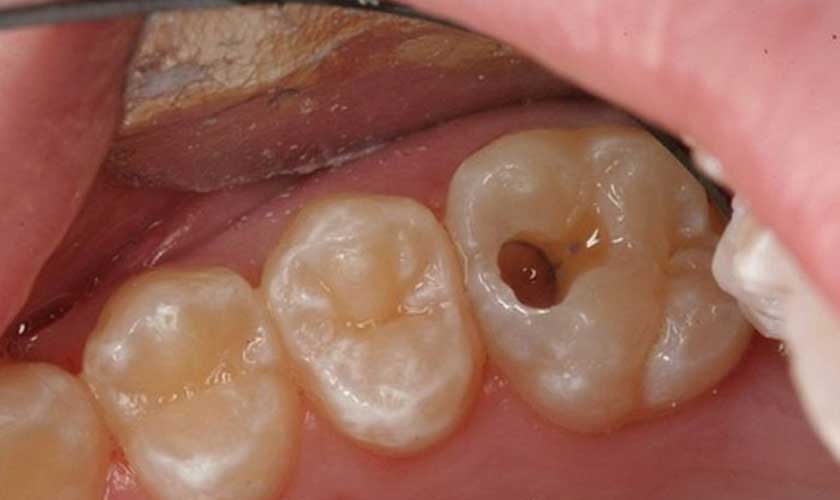
What causes cavities in molars?
There are many factors that can lead to cavities in molars. Here are some main reasons that can cause cavities in molars:
Inconvenient position for oral hygiene
Molars are teeth that grow deep inside the jaw. They are difficult to observe and can be challenging to clean properly.
If the patient is not diligent in brushing their teeth and does not remove food debris from the crevices of molars, cavities are likely to develop.
In particular, cavities in the lower molars are more common than cavities in the upper molars. Food debris often gets stuck on the surface of the teeth and in the crevices, and if not cleaned properly, plaque will form, providing a favorable environment for bacteria to attack the tooth enamel.
Poor tooth morphology
In terms of external appearance, molars have a completely different appearance compared to other teeth. Molar chewing surfaces are wide, with many grooves and fissures. This makes it easy for food debris to get trapped and difficult to remove.
Especially for those who frequently consume sugary foods and carbonated drinks, the risk of cavities in molars increases.
Excessive tooth height
Excessive tooth height is common in individuals who have improper oral hygiene habits. Initially, plaque buildup is thin, but if not removed early, it will accumulate and harden, leading to thick and hard plaque. This creates a favorable environment for the accumulation of cavity-causing bacteria.
In addition to causing cavities in molars, excessive tooth height can also lead to other dental problems such as gum recession, bad breath, and discolored teeth.
Severe damage to tooth enamel
Tooth enamel is the protective layer that shields the inner part of the tooth from damage. However, tooth enamel is susceptible to damage due to various reasons. According to dentists, damaged tooth enamel provides a favorable condition for cavities to quickly develop and penetrate into the tooth pulp.
Some factors that can damage tooth enamel and accelerate the development of cavities in molars include:
- Brushing too hard with a hard-bristled toothbrush can erode tooth enamel and weaken its health.
- Improper teeth whitening can weaken tooth enamel, creating conditions for cavities to attack molars and even penetrate into the tooth pulp.
- Weak tooth enamel can be genetic. Therefore, it is important to visit a dentist to have the best plan to protect molars and overall dental health.
Bruxism (teeth grinding)
Teeth grinding is also one of the causes of cavities and can lead to severe cavities in molars. When grinding teeth, the enamel on the chewing surfaces is affected, weakening the teeth and increasing the risk of developing cavities.
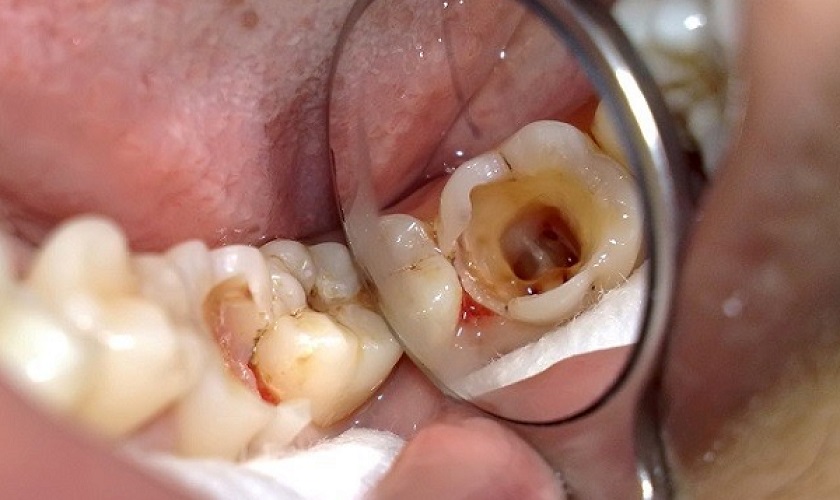
Are impacted molars dangerous?
Impacted molars, in general, and impacted molars with cavities, in particular, can have serious consequences for a person’s health. Specifically, impacted molars with cavities can lead to various issues, such as:
Impacted molars with cavities can deteriorate oral health
If impacted molars with cavities are not treated in a timely manner, they can lead to numerous dangerous complications. The longer they are left untreated, the deeper the bacteria will eat into the tooth, causing more harm and significant damage to the tooth structure.
In more severe cases, the bacteria can travel along the soft pulp and spread to the jawbone and surrounding gum tissues. This is especially concerning when there are important nerves located beneath the impacted molars.
Therefore, it is crucial to detect and intervene with impacted molars with cavities early on to avoid the risk of tooth loss and potential impact on overall health.
Impacted molars with cavities have negative effects on the digestive system
When impacted molars have cavities, eating and drinking can become more difficult than usual. Most people experience reduced appetite or insufficient chewing. This can negatively impact the digestive system.
Impacted molars with cavities cause toothache, stress, and sleep disturbances
When impacted molars have cavities, toothaches can become more frequent. The pain is often more noticeable in the early morning or late evening, when trying to sleep. This is also a common reason why people with impacted molars experience poor sleep or even sleep disturbances. Lack of sleep can lead to fatigue, weakened health, and overall decline in well-being.
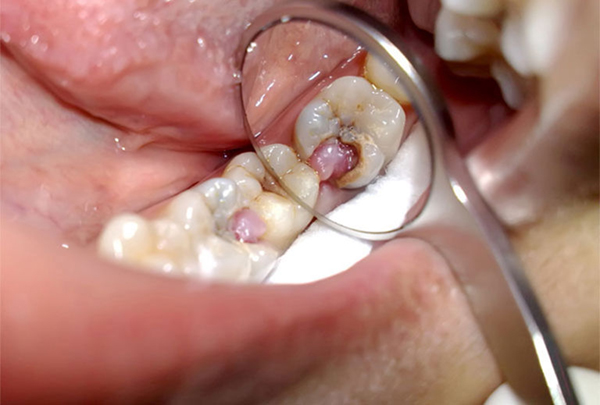
What should we do if a molar tooth has decay? – Should impacted molars with cavities be extracted?
Should impacted molars with cavities be extracted? Impacted molars with cavities not only cause frequent toothaches and sensitivity but also carry the risk of various dangerous complications. So, should impacted molars be extracted when they have cavities?
According to dental experts, preserving impacted molars with cavities should be the top priority. The decision to extract the impacted molars should depend on the extent of the tooth decay and damage. This is because there are many other treatment options available for impacted molars with cavities, such as dental fillings or dental crowns.
However, if the impacted molars with cavities cannot be effectively restored through dental treatments, extraction becomes necessary. The main indications for extracting impacted molars with cavities are when the tooth is completely fractured, severely damaged, with extensive decay that has reached the pulp causing inflammation or impaction of the adjacent teeth.
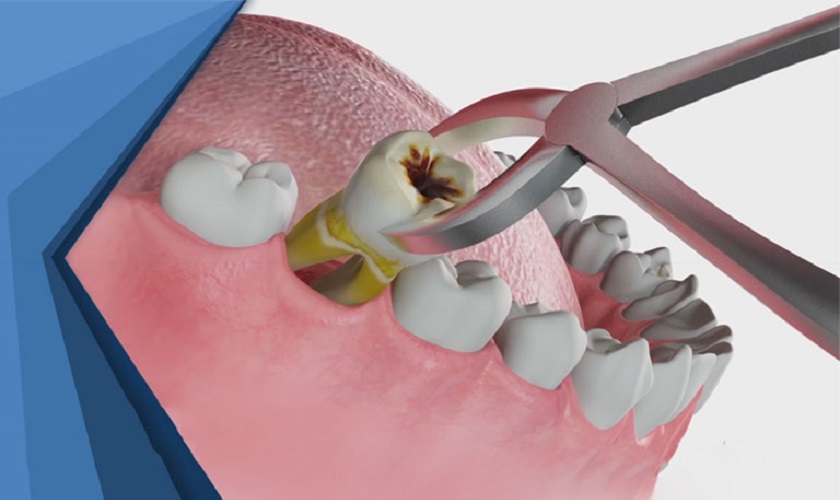
What are the effects of extracting impacted molars?
The purpose of extracting deeply impacted molars is to protect other teeth from damage and ensure overall oral health, avoiding potential dangerous complications
However, losing a molar means losing a tooth that plays a role in chewing, resulting in a gap in the dental arch. This will have a negative impact on the overall chewing force.
If there is no timely intervention, the other teeth may shift and tilt towards the empty space, causing a loss of dental structure. Additionally, bone resorption may occur due to the significant decrease in chewing force.
Therefore, when extracting deeply impacted molars, the dentist may recommend dental implant placement to prevent the risks associated with tooth loss.
Is extracting deeply impacted molars with cavities dangerous?
If preserving deeply impacted molars with cavities is not possible, extraction becomes necessary to protect the surrounding teeth. So, is extracting deeply impacted molars with cavities dangerous?
Compared to other deep cavities, extracting molars requires a higher level of skill and expertise from the dentist. This is because the area beneath the molars is associated with many nerves. Carelessness during the procedure can potentially impact these nerves and lead to serious health consequences.
However, you can rest assured that modern technology, such as X-ray imaging and ultrasonic piezotome extraction, has made the process of removing deeply impacted molars more precise, less bleeding, and safe, with minimal discomfort.
Additionally, it is important to prioritize choosing reputable dental clinics to perform the extraction. A skilled dentist, modern facilities, sterile extraction rooms, and other factors ensure a safe extraction process without potential health risks.
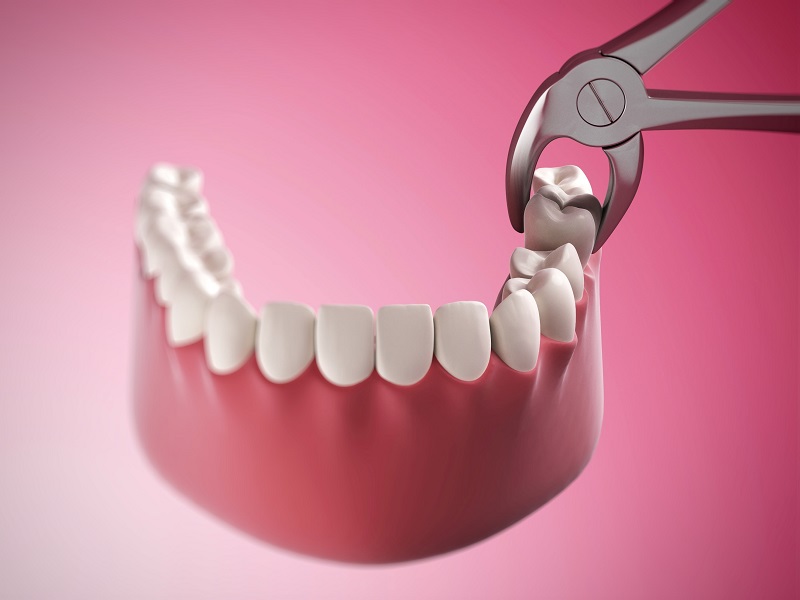
What should be done with molars with cavities?
You should not take molars with cavities lightly. Visit a reputable dental clinic to get a proper examination and receive appropriate treatment plans. The treatment method will vary depending on the severity of the cavity.
For mild cavities in molars:
When the cavity is in its early stages, the dentist will remove the decayed portion. Then, they will use suitable dental materials to fill the cavity in the molar.
Can molars with cavities be filled? According to dental experts, filling molars with cavities creates a protective layer that prevents bacteria from affecting the tooth structure, thus preventing the spread of the cavity.
In cases where the cavity has reached the pulp and caused pulp inflammation, the dentist needs to perform a root canal treatment, clean the infected tissue, and then proceed with filling or crown placement.
If a crown is placed on a molar with a deep cavity, its lifespan can be guaranteed for 8-10 years, or even longer with proper oral hygiene and care.
What should be done with severely decayed molars?
What should be done with severely decayed molars? In the case of severely decayed molars, filling materials cannot effectively treat large cavities, and crown placement cannot restore the tooth. In such cases, extraction becomes necessary.
After extracting the severely decayed molar, you will be advised on aesthetic restorative options such as dental implant placement. This is necessary to prevent bone resorption or changes in facial aesthetics due to tooth loss.
The cost of filling cavities and extracting severely decayed molars
After determining whether to extract molars with cavities, you should visit a reputable dental clinic for an examination of your current oral health and to determine whether filling, crown placement, or extraction is needed.
Then, the dentist will provide specific cost estimates for filling cavities and extracting molars. The cost of filling molars with cavities typically ranges from 300,000 – 500,000 VND, depending on the tooth condition and the materials used for filling. The cost of extracting molars can range from 800,000 – 3,500,000 VND per tooth, depending on the extraction method and the actual condition of the molars.
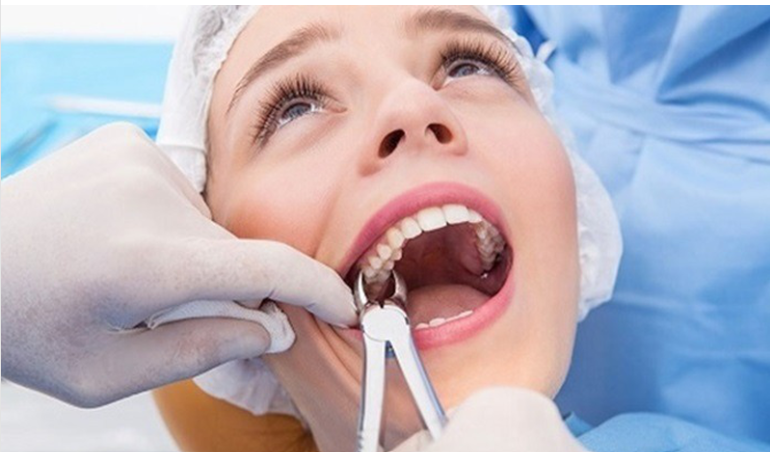
Effective prevention methods for preventing cavities in molars
Cavities in molars pose many risks to a person’s oral health. Therefore, it is important to have early prevention strategies with the following considerations:
- Pay attention to maintaining oral hygiene by brushing your teeth at least twice a day with fluoride toothpaste.
- Use a soft-bristled toothbrush to avoid damaging the tooth enamel and brush in a vertical motion.
- Use dental floss and mouthwash to ensure comprehensive cleaning of the teeth.
- Limit consumption of sugary foods and drinks.
- Drink plenty of water throughout the day.
- Regularly visit the dentist for check-ups and professional cleanings at least every 6 months to prevent dental diseases.
We hope the useful information in this article has helped you understand what to do with cavities in molars and which treatment options are the most optimal. If you have any dental health concerns, please contact BeDental.
With a team of skilled dentists and a focus on keeping up with modern technology, BeDental can provide effective, safe, and optimal preservation for your natural teeth.
Tư vấn chuyên môn bài viết:
BÁC SĨ ĐÀM TRỌNG HIẾU
BEDENTAL - TOP STANDARD DENTISTRY SYSTEM
In HANOI
Address 1: 7B Thi Sach St, Ngo Thi Nham, Hai Ba Trung Dist, Ha Noi. - 0934.61.9090
Address 2: No 129 Hoang Ngan, Yen Hoa, Cau Giay Dist, Ha Noi. - 0934.61.9090
In HO CHI MINH
Address 1: 53 -55 -57 Pho Duc Chinh St, Nguyen Thai Binh, Dist. 1, Ho Chi Minh. - 0766.00.8080
Working: 9am - 8pm everyday
Website: https://bedental.vn/en/
PLEASE LEAVE YOUR INFORMATION IF YOU WANT THE DENTAL CLINIC TO PROVIDE ADDITIONAL CONSULTATION
HƯỚNG DẪN ĐI KHÁM TẠI BỆNH VIỆN RĂNG HÀM MẶT TRUNG ƯƠNG NĂM 2023





